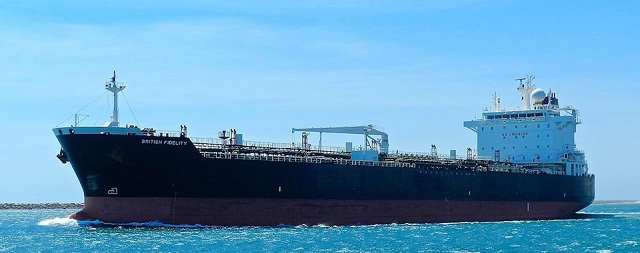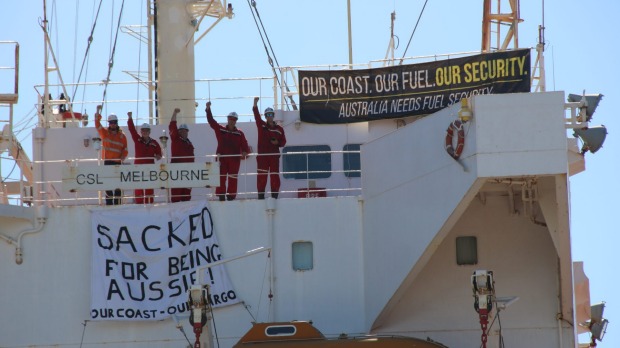Last Aussie-Crewed Fuel Tanker Leaves Australia
BP will take the last Aussie-crewed fuel tanker, the MT British Fidelity, off the Australian coast on May 9.
Ship manager ASP told workers in a letter this week. The vessel is currently in Singapore, and her crew had raised objections in sailing to Singapore fearing their jobs were in jeopardy. Despite assurances the ship would return to trade on the Australian coast, their worst fears were realized, says the Maritime Union of Australia (MUA).
“ASP regrets the departure of the vessel and the possible need for redundancies to occur. These are decisions by BP and not ASP,” the letter says.
The vessel historically ran fuel from Kwinana to Adelaide and more recently Kwinana to Devonport and Hobart.

Ironically, the arrival of the letter marks exactly one year since the crew got their letter of termination from BP’s British Loyalty.
MUA National Secretary Paddy Crumlin said Australia moves 99 percent of its freight by sea and has the fourth largest shipping task in the world.
“Shipping is an industry vital to Australia’s national interest, and of course we should have a strong coastal shipping fleet rather than deregulation and subsequent race to the bottom,” Crumlin said.
“The Turnbull Government’s hypocrisy is breathtaking. They want to remove hardworking Australians who pay tax in this country and replace them with exploited foreign labor on as little as $2/hr who are employed on flag of convenience shipping, which is itself a global tax scam.
“We need to maintain the maritime skills base, as well as protect jobs, the environment and our national security. The decline of manufacturing is also significant problem when it comes to jobs, and these industries should be supported.”
“Fuel security is a major threat – not just in terms of being left solely at the mercy of international markets but heaven forbid, should there be a refinery fire in Singapore or a terrorist attack on shipping lanes, Australia only has three weeks’ supply of petrol at its disposal.”
Liberal Senator Bill Heffernan questioned the government’s priorities, telling ABC radio on December 9 that defence force officials have described fuel security as the "greatest military threat" facing the nation.
“Since 1995, the number of Australian-flagged product tankers working the coast has reduced from 11 to zero, while the number of refineries has dropped from eight to four,” Crumlin said.
“In 2000, Australia imported 60 percent of its fuel, and that number is now well over 90 percent and rising. In 2025, it is forecast to be 100 per cent and the MUA doesn’t think that’s good enough.”
Federal Department of Industry consultants estimate that by 2016-17, the equivalent of between 53 and 64 full-time tankers will be required meet Australia’s needs.
“The Federal Government’s Energy White Paper, released last year, said the government would release its response to the International Energy Agency’s 90 day fuel storage recommendation in 2015 but that hasn’t happened. Well why not?” MUA Western Australia Branch Secretary Chris Cain said.
“Why is it that regional Western Australia and Darwin pay some of the highest prices for petrol anywhere in the country when we are the closest to Singapore, where much of Australia’s fuel is refined?
“Market forces isn’t a good enough answer – we need to refine in Australia and ship it using Australian crews.”

Security Risks
On Wednesday, opposition infrastructure spokesman, Anthony Albanese, said the Turnbull government is undermining its own efforts on national security with its ongoing push to replace Australian seafarers with foreign mariners earning third world wages.
Legislation before the Parliament will require deeper background checks on Australians seeking identity cards allowing them work in the nation’s ports and on ships, adding to existing checks for links to terrorist groups a new check on links to organized crime.
The proposed measure responds to the recommendations of a recent inquiry into the trafficking and use of the drug ice.
“However, at the same time as it will toughen the background checks, the government is continuing to encourage shipping companies to register their vessels overseas and hire foreign mariners whose backgrounds are not subject to the same detailed background checks,” said Albanese.
In a submission to a Senate inquiry into increasing use of foreign vessels registered in so-called flag of convenience nations like Liberia and Panama, the Department of Immigration and Border Protection warned:
There are features of flag of convenience registration, regulation and practice that organized crime syndicates or terrorists may seek to exploit.
Reduced transparency or secrecy surrounding complex financial and ownership arrangements are factors that can make flag of convenience ships more attractive for use in illegal activity, including by organized crime or terrorist groups.
This means that flag of convenience ships may be used in a range of illegal activities including illegal exploitation of natural resources, illegal activity in protected areas, people smuggling and facilitating prohibited imports or exports.
“It makes no sense to be toughening background checks into Australian mariners and port workers to protect the nation from organized crime at the same time as the government is determined to replace Australian mariners with foreign workers,” said Albanese.
The opinions expressed herein are the author's and not necessarily those of The Maritime Executive.

